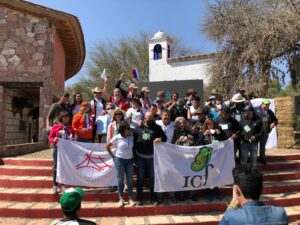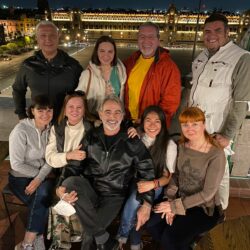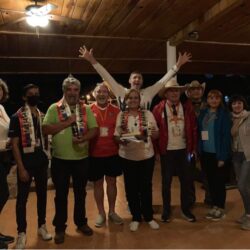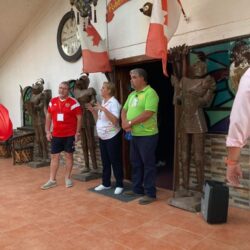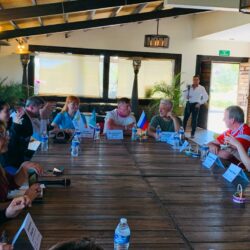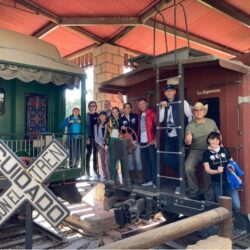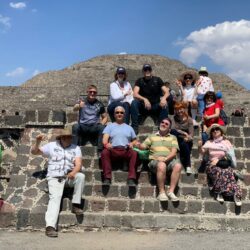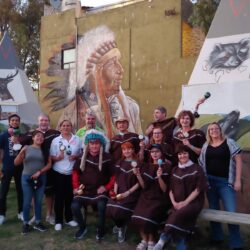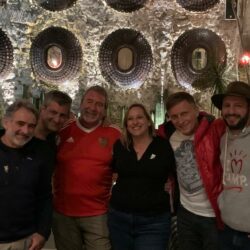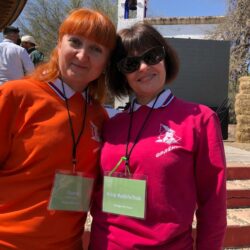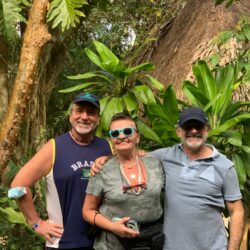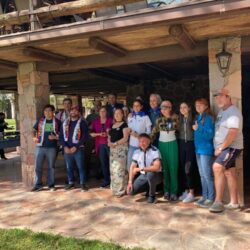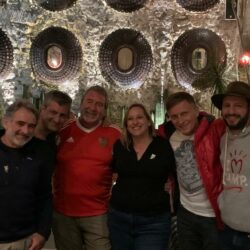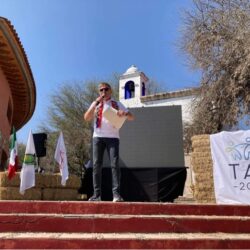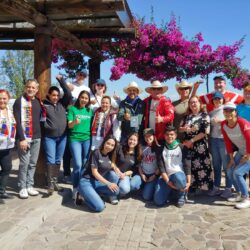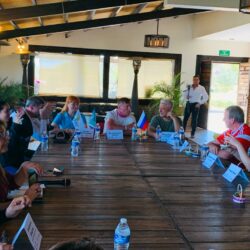An educational camp tour took place in Mexico from February 15th to 20th, 2022. Its participants were the representatives of the Russian tourism industry, private camp directors, and a delegation of the Russian Children’s Centre “Orlyonok”.
“Participating in such events is a perfect opportunity to find new contacts with colleagues, to get acquainted with educational and leisure camp activities in different countries. As well as to exchange techniques and get to know the recreation facilities. Also, it`s a great platform for cultural exchange and establishing partnership and friendship”, Alexander Dzheus, the president of National Camp Association of Russia and the Russian Children`s Centre “Orlyonok” director, noted.
The educational camp tour was arranged by the Mexican Camp Association with the assistance of the ICF president of 2008-2014 and the member of the Interregional Public Association “Assistance to the Children`s Rest” Valery Kostin.
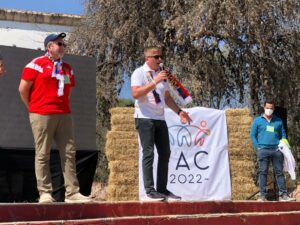 “Russian camp professionals have a long-standing friendly relation with our colleagues from Mexico. The National Camp Association of this country was founded in 1994. Now it consists of 40 camps. They take an active part in the national and international congresses and share their experience. Russian camp professionals visit Mexico for the 3d time yet. Every year the camp tour program become more interesting and productive”, Valery Kostin commented.
“Russian camp professionals have a long-standing friendly relation with our colleagues from Mexico. The National Camp Association of this country was founded in 1994. Now it consists of 40 camps. They take an active part in the national and international congresses and share their experience. Russian camp professionals visit Mexico for the 3d time yet. Every year the camp tour program become more interesting and productive”, Valery Kostin commented.
The route through Mexico for the Russian delegation started in Mexico City, the capital of the country, and then ran through the states of Guanajuato and San Luis Potosi. The first place of the visit was camp “Tatanka”. It is located on the territory of 47 hectares, and can accommodate 40-60 campers at a time. Children at “Tatanka” are engaged in sports, different kinds of creative work; they study the culture of their nation and take care of horses. The philosophy of the camp is to teach children to live in peace and harmony with nature, instill in them a culture of friendship, not hostility.
“The main thing that unites us is a common view on the upbringing of children in camps. We teach schoolchildren to communicate effectively, to listen to each other and hear each other, and we help them to achieve successful socialization. And in these aspects, our activities do coincide. As a representative of the tourism industry, I`d like to say that we are ready to send Russian children to Mexico camps, as well as to welcome Mexican children to our country`s camping programs. Such exchanges can become the basis for the interpenetration of cultures and the development of friendly relations between children”, Tatiana Ivanova, the general director of “Dial-tour”, said.
During the press conference with the representatives of local media at “Tatanka” camp the Russian delegation members presented their work experience, having told about the existing system of state support in the country, types of recreation facilities, as well as the opportunities that children have in Russian camps.
“The children of Mexico visited Russia and told us that in this country schoolchildren have the opportunity to get a camp voucher for certain achievements after having passed a competitive activity. In Mexico, only children from wealthy families can get into a camp, and this is a significant problem that needs to be solved. After all, the camp itself is a serious institution of education, as there children undergo socialization, develop their communication skills, and gain useful knowledge. Observing the experience of the camps in Russia, we set ourselves an important task – to draw the attention of the authorities to the activities of camps in Mexico and to receive state support in that. The solution of this issue will create conditions for organizing recreation for children whose families have modest income, and will give a new impetus to the camps development”, Jessica Lajud, the president of the Mexican Camp Association, explained to the reporters.
During the camp tour program, the Russian group visited camps «Kukaponga», «Santa-Ursula», “Los Huizaches”, “AllTourNative”, “Jungle camp”. Camp professionals got involved in different activities and studied in details the operational features of these camps.
«This trip gave me a lot to understand. I was amazing to me to see such cool camps as «Kukaponga» and «Santa-Ursula», «AllTourNative», «Jungle camp». Frankly speaking we have only a few such camps in Russia. Here camp people create a paradise and put all their heart and soul into it. Yes, they do not have a governmental support, but at the same time they are not feeling seriously controlled, and it provides them with the freedom for creativity and development. Though they of course have self-control system. We will comprehend many things and adopt the best practices to our camps with regard to our legislation and current requirements», Marat Alyushev, the Coordinating Council member of the Interregional Public Association “Assistance to the Children`s Rest”, said.
The Russian delegation was introduced to a whole range of different camps, and each of them had its own highlight. The stunning “Kukaponga” surprised with a warm family atmosphere, an unusual creative program and a unique design of residential houses; the amazing “Santa-Ursula” – with the spirit of adventure, a variety of opportunities for children and unusual decoration. Staying at the railroad cars of the President of the Mexican United States, mastering karting, scuba diving or taking care of animals… This camp gives unforgettable emotions.
“It seemed that there was already nothing more to surprise us with, but in Cancun the delegation was invited to visit “AllTourNative”. While passing this hiking trail, we experienced the thrill on the zipline, crossed the suspension bridge, descended into the water cave on ropes, feeling children’s emotions for real. Now we`ve started to dream of creating a similar trail in Russia,” Natalia Alyusheva, co-owner of the “Cosmos” camp in Samara, shared her emotions.
“We were pleased with the fact that camp directors Genaro Ortiz Tirado and Marcela Labiaga did come to Cancun to show us more of their wonderful camps. Their attention is worth a lot”, Valery Kostin said.
The final event of the educational tour was the annual conference of the National Camp Association of Mexico. It took place at “Los Huizaches” camp, there were about 200 participants – camp and program directors, and counsellors. During the master classes, the participants tested new game technologies and methods of team building, studied modern leadership techniques and discussed the possibilities of self-education and self-development.
The president of the National Camp Association of Russia Alexander Dzheus talked with the participants of the conference. During the opening ceremony, he told his colleagues about how the camp counsellors are being trained in his country, how to take part in the professional camp exchange program, as well as about the goals and objectives of camps all around the world.
“The acquaintance with the activities of the Mexican camps and the whole process of communication between us confirmed the unity of our aspirations, the desire to create maximum opportunities for self-affirmation, self-determination and development of child’s talents. Together with the president of the National Camp Association of Mexico, we discussed a number of important steps: already during this year 10 schoolchildren from Mexico can become participants of one of “Orlyonok” camp programs. In addition, we are discussing the possibility of professional exchanges of our camp counsellors, holding online meetings and, most importantly, organizing an educational Russian camp tour for camp directors from Mexico,” Alexander Dzheus summarized.
Camp tour program included both business and cultural tracks. The Russian group traveled to Teotihuacan archeological area located close to the Mexico City, visited Querétaro, San Miguel de Allende, and Cancun.
“We want to say thanks to all our Mexican friends, we deeply appreciate their hospitality and productive program of an unforgettable camp tour. Please accept our words of gratitude for Jessica Lajud Moreno, Diana Ramírez Cruz, Genaro Ortiz Tirado, Oscar Bücheller de Pavia, Maria Jose Méndez, Ricardo Santander, Ana Paula Pérez, Marcela Labiaga, Ursula Martínez Lavin, Mauricio Medellín, Francesco Carlo Lecanda, Sergio Giovanni Lecanda, Christian Axel Duarte Quijada, Pablo Casas Alatriste,” Oksana Petrovskaya, the ICF Ambassador in Russia, said.
